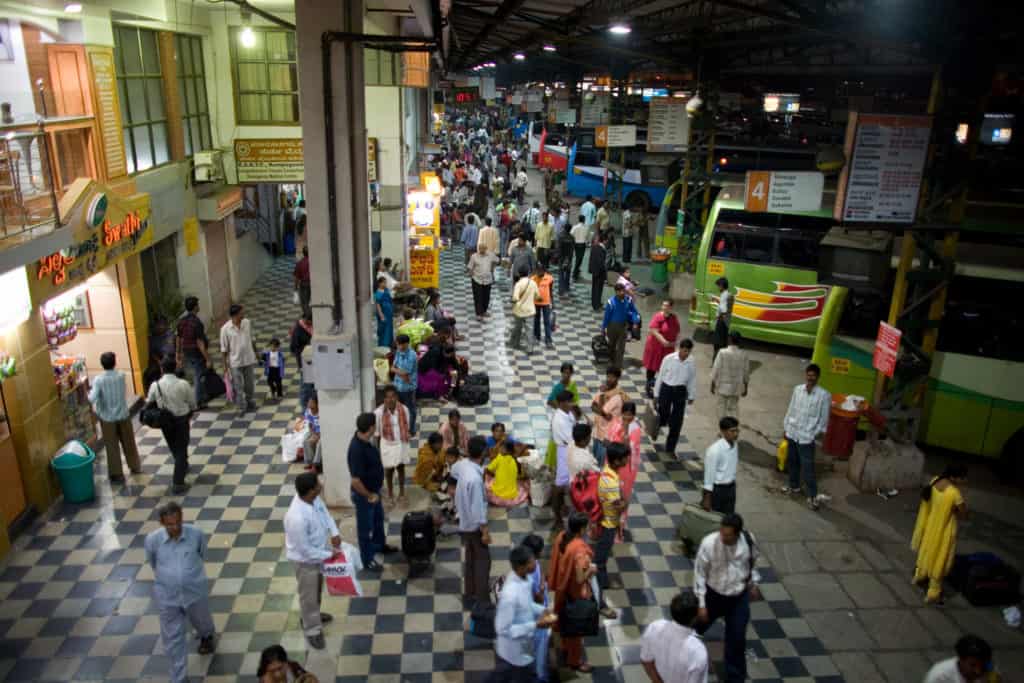
Renuka lives in a three-bedroom house in upmarket Koramangala. Her children go to a prestigious school. She can afford these thanks to her rich clients and her three paying guests who too are sex workers.
But with her children home since lockdown, she can no longer entertain clients at home. The paying guests could not afford the rent and have gone back to their villages. One of her clients died after contracting COVID-19 a week after visiting her. She got herself tested and was relieved when results came negative.
Once lockdown eased, her clients began to pester her, but with the kids at home, she refused to entertain them.
A month after lockdown eased, a drunk client landed at her doorstep and would not take a ‘No’. The argument turned ugly with the neighbours watching. Since then, Renuka has faced hostility and taunts from her neighbours. And the landlord asked her to vacate.
Renuka’s travails are not an exception. Bengaluru, unlike Kolkata, Mumbai or Delhi, does not have a designated red-light area. The women either work from rented homes in middle class neighbourhoods, with neighbours none the wiser, or cruise in places like bus terminals and markets, renting rooms in cheap lodges and hotels by the hour. Some rent rooms of other sex workers who work out of their homes, but these are costlier.
The lockdown had literally locked down the livelihood of most of these women. In the absence of the anonymity and fraternity that red-light-areas offer, they had limited access to scattered doles.
When the lockdown eased, they were back at their haunts throwing caution to the winds, as an empty stomach overcame the fear of an unseen disease.
Violence both at home and work
Mythily lives in a small house in crowded Adugodi and used to solicit near the Majestic bus terminus. The money she earned kept the domestic violence she suffered from her poorly-earning husband at tolerable levels.
“I told my family I worked as a cook in a few homes, to explain the evening hours of work,” says Mythily. “I earned Rs 10,000 to 15,000 a week. I hid most of it. That has been a help now when income is zero. During the first three months, some NGOs distributed free dry rations to sex workers. That helped, but was not sufficient. We went to different points where food was distributed to migrants, and ate there”.

But when even these options vanished, the domestic violence returned. Now, with the lockdown eased, she is back at Majestic, jostling for the few available clients.
Narmada was a regular at Cubbon Park most evenings, catering to four or five clients a day. Once lockdown was imposed, the park was deserted. But she hung around. On the second day she was slapped and abused by a policeman. He made her give him free sex. She never returned to the park.
When she and her family began to starve, they moved to her in-laws’ place 40 km away. Now they have some food since they have goats, chicken and a small vegetable patch in the small yard.
Some turn to virtual sex, most have no place to work at all
Shabnam and her two friends, regular cruisers at Majestic and Commercial Street, share a small flat in Thippasandrra. After two months of semi-starvation during lockdown, they began offering virtual sex. The money is transferred to their Paytm accounts. “This is not a bad option,” says Shabnam. She now doesn’t have to haggle or hang around in risky places. There is also no risk of infection.
Since the lockdown eased, Kavita is back at Majestic after months of near-starvation. But the old lodges where she used to be a regular, are now either closed or refuse to allow people like her. So she started going out late at night and used some of the empty buses to service clients. She was once caught in the act by a driver and it turned into an ugly fight. In the end, he allowed her to use the bus provided she gave him and a couple of his friends free service.
But with the lockdown mostly rolled back, the buses are not empty anymore and Kavita has to plead with lodges for rooms at higher rates.
Shailaja used to entertain men only during the day at her Sarjapur apartment, when her husband would be at work and children at school. Now that is no longer possible. After a couple of COVID-positive cases in her housing complex, the residents’ association is strict about visitors.
She has tied up with another sex worker Manisha, who stays alone. She offers Manisha Rs 150 for every client she entertains. Her family thinks she is working in some small garment unit.
Anjali’s favourite haunt was Chickpet — one of the city’s busiest trading centres, with easy access to lodges in bylanes. Though clients are available now, the lodges are fewer and fussier. Sometimes she goes during closing hours when some shopkeepers will let her into a back room for a quick session. But her earnings are nowhere close to pre-lockdown days.
“For us the choice is between dying of disease, or starvation,” Anjali laments.
“We cannot wear masks at all times,” says Anjali “We have to attract clients quickly. Many shout at us to keep our masks on. Scares us too. I have lost three friends to COVID-19. One of them was already HIV+ve and another had TB.”
Little support from government
Razia has not been able to get clients even once or twice a week. So she scours garbage for leftover food. Or goes at night to pick leftovers outside food joints.
Apart from free rations and some money – about Rs 1500 to Rs 2000 – that a few sex workers received in the first two or three months of the lockdown, the women have had to fend for themselves. Some received dry rations from the Karnataka Sex Workers’ Union, various support groups for transpersons, small groups of samaritans and citizens.
But these were all limited owing to paucity of funds, geographical constraints and the ignorance of the sex workers themselves about these distribution campaigns. There were no clearly declared government programmes that the sex workers could avail of. The lack of identity papers like Aadhar or ration cards was also a barrier.
Very few sex workers have alternatives
Lakshmi and Ravikala who stay together near the Agara Market have opened a stall on the pavement outside their house selling tea, coffee, bajjis, biscuits and bonda. After their roommate contracted COVID-19 and died in hospital, they have been shaken although they themselves have tested negative twice.
Mallika, whose husband now works from home, cooks and delivers food to a few bachelors and seniors in her locality to make ends meet.
It has now become harder for these women to find clients. Not only are there fewer people out, most do not want to risk COVID-19 through careless sex.
Majestic, Chickpet and Commercial Street used to be high-earning areas for sex workers. A few hours of work would fetch them anything between Rs 2000 to 5000. Many of the women worked a few days a week and earned enough to last them the month.
However, with fewer people visiting these areas, there are often fights among the women over potential clients. Friends have become rivals. This often leads to the men fleeing rather than attract unwelcome attention from passersby or cops.
For most sex workers, these are difficult times with less income and multiple risks. Some have settled for lower incomes from the same trade and a frugal lifestyle. Others have changed the way and place of work. Some have moved back to their families in their hometowns. A few have turned to other forms of livelihood.
Keeping body, soul and spirit together has become a desperate struggle for these women.
*All names have been changed to protect identities.
[In Part 2 of this series, we explore why sex workers in Bengaluru are unable to access government support, and how this could change.]
Insighful.Look forward to part two
Very insightful article. For one, had not read about this side of Bangalore at all before. Thanks for sharing these stories.
THIS IS REALLY HURTFULL TO HEAR THE OTHER SIDE OF THE STORY AND TO BE ON THE HUMAN SIDE AND LOOK AT STARVATION IS SADENING.VERY INSIGHTFULL. THANKS WISH COULD HELP BUT THIS LOCK DOWN HAS GOT EVERYONE.
Kindly add ways of helping them.
Gives a good insight into what all problems they face on account of COVID. One did not even realise that such sorts of problems would be there! Good article.
Excellent article. Throws light on what the sex workers are going through during the lockdown, a topic generally brushed under the carpet.
Reality is painful and thanks to journalists like Smt.Annam for her clarity in picturising without prejudice. Sure to look ahead for better days with such subtle awakening.
Very insightful and well written article about a world hardly talked about.
very well written, invokes thoughts.
Insightful. This is a very sad state of affairs.
Good piece with case studies. Would have been more effective if a statistical profile was also included.
Well-researched article on a very vulnerable section of our society. They need to be rehabilitated.